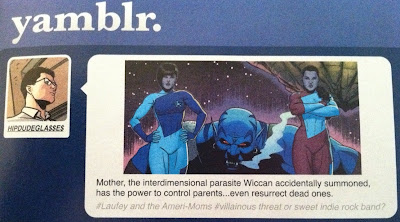 |
| Clint's loss, really |
Last month I wrote about the first three issues of Kieron Gillen and Jamie McKelvie's Young Avengers. Today Young Avengers #4's out, and Gillen has said it's his favorite (so far). Here's the run-down on this issue in which a hot alien does backflips and defeats monsters while explaining to the reader why he has not had sex with Clint Barton.
Summary:
Noh-Varr (who is adamantly against his former Marvel Boy title) and Kate escape the Skrull and quickly rescue the rest of the hip young beamslingers, who were about to be off'd by Teddy's fake dead mom. Of course, Noh-Varr's dead parents immediately resurface to join the league of Fake Dead Nagging Parents, whom the Young Avengers try to elude in Central Park. In a talk with Teddy, Loki brings on the passive aggressive bitchery big-time to undermine the former's relationship with Billy, but he does have some good points about the improbability of Teddy and Billy's meeting. Then Loki has an epiphany while complaining about how his birth father wants to eat him, borrows Billy's power, and teleports away. Meanwhile, a horde of zombie parasite people converge on our remaining heroes. The end.
 |
| Plot twist: they ARE forming a rock band. It's all part of their evil plan to embarrass America and Loki...to DEATH! |
Random Notes:
-I'm loving Noh-Varr. What a cutie. Avengers, you don't banish a guy who loves vinyl and is built like that - okay, maybe you banish him to Brooklyn or San Francisco...or Portland...or Austin... Anyway, you done good, Kate.
-Look at Gillen being all clever again with a Family Circus-style map of Noh-Varr's ass-kicking path. Update: I shamefully underestimated McKelvie's input in the planning and structure of this. He gives a great behind-the-scenes look at how this spread came about here.
-I think Gillen has a great handle on the tone. Everything's rapid-fire witticisms and exaggerated young adult culture, but it doesn't come off as overly cloying, at least not to me. Diablo Cody faced "nobody talks like that!" criticism for Juno, but that was never the point (nor was it Wes Anderson's or P.G. Wodehouse's). When Noh-Varr posed dramatically and declared "come with me if you want to be awesome," I chuckled rather than rolled my eyes. The "Yamblr" Tumblr parody at the beginning of each issue annoyed me at first with its smug assurance of adoration, but hey, it's funny and goes well with this world.
-This cleverness also makes it a nice companion to Matt Fraction (Gillen's "Everything Burns" partner) and David Aja's laid-back Hawkeye series, which was just nominated for a few Eisners.
-This storyline is really bringing home the trope that if you're going to be a superhero, your parents have to die. You can get new ones if you want, but the first-round parental figures absolutely need to be dead.
-America Chavez has two jobs: to punch everyone and drag Loki around.
-Shouldn't Loki's All-Language have auto-corrected "loco" to "locas" when describing America's moms, or was that a specific word choice he employed to increase his obnoxiousness? Probably the latter.
-I am 90% sure Loki's "you are a very lovely daydream" line to Teddy was just to get the Yamblr fangirls going.
-What was Loki's revelation? Maybe the parasite didn't know Loki was adopted* and therefore considers Odin his real dad (if he still does), hence Laufey's appearance? And this tells Loki something about the parasite/spell? Hm...
*a.k.a. Odin found a baby on the ground.
What's Next?
Will Loki save the day or retreat to Malibu with a margarita? Will Teddy and Billy's relationship collapse in a storm of tears and whined accusations? Young Avengers 5 is out May 22.
Update: Here are some more images from YA4 along with Kieron Gillen and Jamie McKelvie talking about their work relationship.
Images:
Noh-Varr being a boss: CBR's preview
Yamblr: Young Avengers #4
YA4 cover: Marvel's preview





